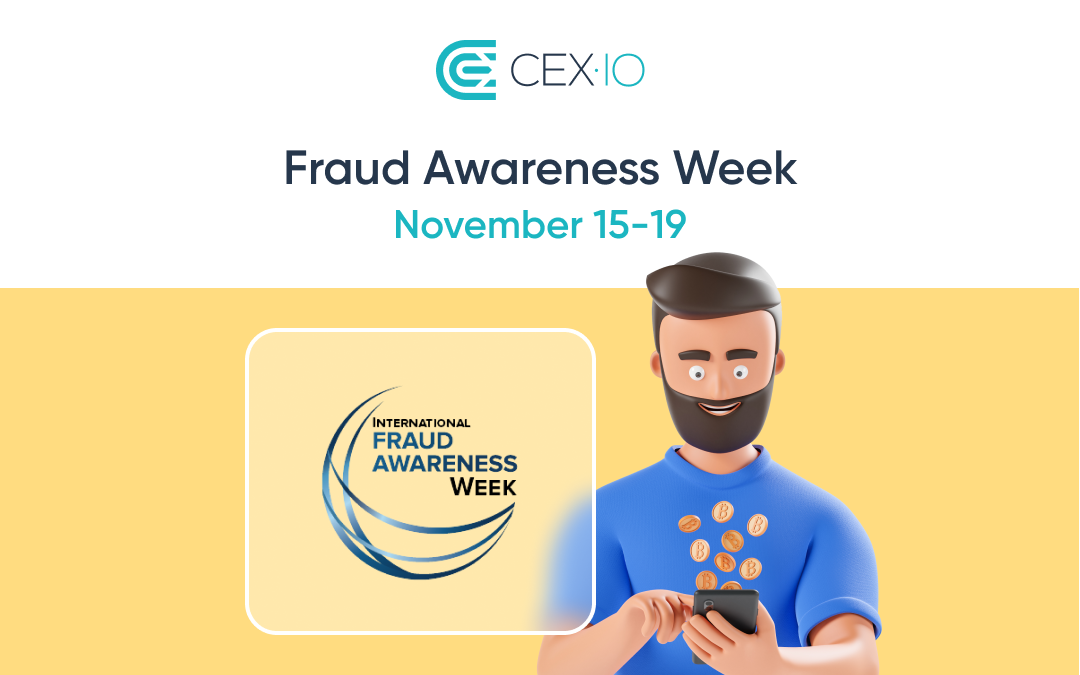CEX.IO is proud to be a supporter of International Fraud Awareness Week, taking place on November 15 – 19, 2021. We’ve partnered with 600 other global organizations to join in the fight against fraud.
Fraud is a problem affecting companies around the world. In 2020 alone, organizations lost roughly $3.6 billion due to fraud (2504 cases from 125 countries were studied).
The main goal of International Fraud Awareness Week is to raise the perception of fraud-related matters and the real-life consequences they bring.
CEX.IO is committed to combating fraud by helping to deliver fraud awareness content and training to customers and employees alike.
For more information on International Fraud Awareness Week, visit the official website.
You may find further useful information at this link.
Here are some tips for identifying and protecting yourself from fraud and other scams:
How to Identify Fraud:
To help prevent fraud and avoid becoming a victim, you must first learn to identify the activity. Once you know that something isn’t right, you can report and perhaps even save your funds from being stolen.
A few indicators that can help you identify fraud:
- Unexpected charges on your credit account
- Unrecognizable accounts on your credit report, or other inaccurate information
- Bills or statements that unexpectedly stop arriving by mail. This could mean an identity thief has taken over your account and changed your billing address.
- Checks are significantly out of order on your bank statement
- Banks and financial institutions freeze accounts unexpectedly
- Receipt of credit cards for which you didn’t apply
- Unreasonable denial of credit
- Notification that you’ve been denied credit for which you didn’t apply
- Debt collectors contact you about merchandise you didn’t purchase
- Notifications about the address, password, or information changes that you did not make
Different Types of Fraud:
Now that we’ve learned how to spot some red flags, let’s explore the specific types of fraud that are frequently practiced in the digital space.
Account Takeover (ATO) – Account Takeovers are the unauthorized access of a user’s account in order to steal identity credentials, execute a fraudulent transaction or engage in varying types of abuse.
Friendly fraud – Friendly fraud is a type of first-party fraud. Friendly fraud can take many forms, but typically involves an actual consumer obtaining goods or services, then claiming they did not make the purchase, did not receive the goods, or only received a fraction of items, in order to keep the goods or services without paying for them.
Social Engineering – Social engineering is the psychological manipulation of another person by preying on emotions and vulnerabilities in order to extract information or convince him/her to take a desired action. Social engineering can be the initial layer of other fraud types such as account takeovers and authorized push payment fraud (scams).
Tech support fraud – This is where a fraudster impersonates a technical support team and manipulates the victim to coerce them into sending payment for falsified service.
Investment fraud – There are many different types of investment fraud. They usually involve criminals contacting people out of the blue and convincing them to invest in schemes or products that are worthless or do not exist. Once the criminals have received payment, they cease contact with the victim.
Third-party fraud – Third-party fraud occurs where an individual’s identity or personal details are used without their consent or knowledge, to gain access to credit or products. It also includes manufactured identities, with the fraudster creating a new identity using stolen and false information.
Scam Awareness Checklist:
Some of the most common fraud schemes have been collected to form a quick list below. You can learn about these schemes – and how to avoid them – from a variety of sources.
- Phishing
- Email scams
- Online shopping scams
- Romance scams
- Impersonation scams
- Investment scams
- Dark patterns
- Donation scam
- Threat scam
- Catfishing
- Cold call scams
- 419
- Chain mail
- Online survey scams
How to Protect Yourself From Digital Fraud
To keep your data secure, you should:
- Antivirus and firewall protection
- Antivirus helps secure your devices by scanning for malicious viruses and attacks.
- Firewalls offer an extra layer of network protection by filtering traffic and blocking outsiders from gaining unauthorized access to the private data on your computer.
- Electronic device updates
- The latest software will automatically install the newest security updates that are designed to protect from newly emerging fraud types.
- Password manager programs
- An app that helps create and store strong passwords without having to remember them.
- Multi-factor authentication
- A service that requires a second round of authorization after entering your login and password to verify your user identity. It helps to prevent someone from simply guessing your credentials.
- Secure connections
- Be careful with confidential information outside secure IT environments.
Final Thoughts
We thank you for taking the time to read this blog post on fraud/scam awareness. We hope the post has been useful in helping you understand, detect and protect yourself from fraudulent activity.
We have posted additional tips and helpful articles on our social media platforms such as Facebook, Twitter, and Telegram. We invite you to connect there.
CEX.IO team
